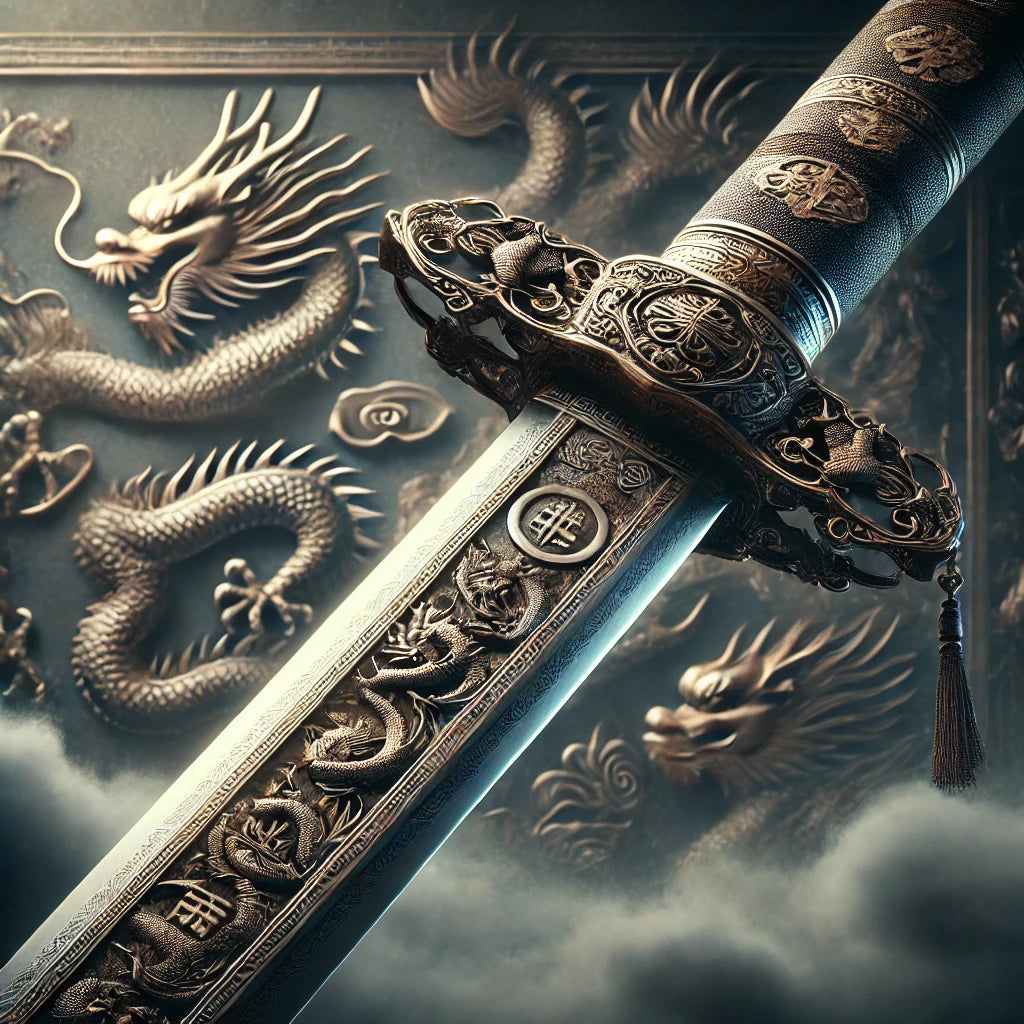
Symbolic Meanings of Swords and Knives in Chinese Culture
Share
Introduction
Swords and knives in Chinese culture are profound symbols that embody a wide range of meanings, from authority and power to bravery and loyalty. These iconic blades have been integral to Chinese society for centuries, not only as tools of war and self-defense but also as representations of cultural values and social hierarchies. This section delves into the symbolic significance of swords and knives in Chinese culture, exploring how they represent power and status, as well as bravery and loyalty, and their enduring presence in various cultural and artistic expressions.
1. Symbolic Meanings of Swords and Knives
1.1 Swords as Symbols of Power and Status
In Chinese society, swords and knives have long been associated with power, authority, and social status. The possession and display of a finely crafted blade were often indicators of one's rank and influence within the community.
Imperial Authority: Emperors and high-ranking officials traditionally carried ornate swords as symbols of their supreme authority and governance. These ceremonial blades were not only functional but also adorned with intricate designs and precious materials, reflecting the holder's status and the imperial power.
Martial Class Prestige: Warriors, including generals and elite soldiers, wielded swords as marks of their martial prowess and elite status. The quality and craftsmanship of their blades signified their skill, bravery, and important role within the military hierarchy.
Heirlooms and Family Honor: Swords were often passed down through generations as family heirlooms, symbolizing the lineage and honor of a family. These inherited blades carried stories of past heroes and served as reminders of the family's esteemed position in society.
1.2 Swords as Symbols of Bravery and Loyalty
Beyond representing power and status, swords and knives in Chinese culture are powerful symbols of bravery, loyalty, and moral integrity. They embody the virtues that are highly valued in Chinese society and martial traditions.
Bravery and Valor: Swords are frequently associated with courage and the willingness to defend one's honor and community. Legendary warriors and heroes are often depicted wielding their swords in acts of bravery, reinforcing the blade's role as a symbol of valor.
Loyalty and Honor: The act of bearing a sword is deeply intertwined with the concepts of loyalty and honor. In historical narratives and folklore, characters who are loyal to their leaders or cause are often portrayed with their swords as extensions of their unwavering commitment and integrity.
Moral Fortitude: Swords also symbolize moral strength and the ethical responsibilities of those who wield them. They are seen as tools for upholding justice and righteousness, reflecting the bearer's adherence to societal and personal codes of conduct.
2. Cultural and Artistic Representations
Swords and knives are not only functional tools but also significant elements in Chinese art, literature, and rituals, further cementing their symbolic meanings in the cultural consciousness.
2.1 Art and Literature
Symbolic Motifs: In Chinese art and literature, swords often feature motifs such as dragons, phoenixes, and lotus flowers, each carrying its own symbolic meaning. These designs enhance the blade's representation of power, rebirth, purity, and other cultural values.
Literary Figures: Iconic literary characters, such as Guan Yu from "Romance of the Three Kingdoms," are closely associated with their legendary swords, which symbolize their heroic qualities and unwavering loyalty.
2.2 Rituals and Ceremonies
Confucian Ceremonies: In Confucian rituals, swords are used as symbols of righteousness and moral authority, reinforcing the values of duty and honor within the societal framework.
Martial Arts Demonstrations: Swords play a central role in martial arts performances, where their movements and forms symbolize the practitioner's discipline, control, and mastery of martial skills.
3. Conclusion
Swords and knives hold a revered position in Chinese culture, embodying a blend of power, status, bravery, and loyalty. Their symbolic meanings extend beyond their physical uses, permeating various aspects of cultural and artistic expression. From imperial regalia and martial traditions to literary depictions and ceremonial practices, these blades serve as enduring symbols of China's rich heritage and the values that have shaped its society. Understanding the symbolic significance of swords and knives provides a deeper appreciation for their integral role in Chinese culture and the enduring legacy they continue to uphold.
Swords and knives in Chinese culture are profound symbols that embody a wide range of meanings, from authority and power to bravery and loyalty. These iconic blades have been integral to Chinese society for centuries, not only as tools of war and self-defense but also as representations of cultural values and social hierarchies. This section delves into the symbolic significance of swords and knives in Chinese culture, exploring how they represent power and status, as well as bravery and loyalty, and their enduring presence in various cultural and artistic expressions.
1. Symbolic Meanings of Swords and Knives
1.1 Swords as Symbols of Power and Status
In Chinese society, swords and knives have long been associated with power, authority, and social status. The possession and display of a finely crafted blade were often indicators of one's rank and influence within the community.
Imperial Authority: Emperors and high-ranking officials traditionally carried ornate swords as symbols of their supreme authority and governance. These ceremonial blades were not only functional but also adorned with intricate designs and precious materials, reflecting the holder's status and the imperial power.
Martial Class Prestige: Warriors, including generals and elite soldiers, wielded swords as marks of their martial prowess and elite status. The quality and craftsmanship of their blades signified their skill, bravery, and important role within the military hierarchy.
Heirlooms and Family Honor: Swords were often passed down through generations as family heirlooms, symbolizing the lineage and honor of a family. These inherited blades carried stories of past heroes and served as reminders of the family's esteemed position in society.
1.2 Swords as Symbols of Bravery and Loyalty
Beyond representing power and status, swords and knives in Chinese culture are powerful symbols of bravery, loyalty, and moral integrity. They embody the virtues that are highly valued in Chinese society and martial traditions.
Bravery and Valor: Swords are frequently associated with courage and the willingness to defend one's honor and community. Legendary warriors and heroes are often depicted wielding their swords in acts of bravery, reinforcing the blade's role as a symbol of valor.
Loyalty and Honor: The act of bearing a sword is deeply intertwined with the concepts of loyalty and honor. In historical narratives and folklore, characters who are loyal to their leaders or cause are often portrayed with their swords as extensions of their unwavering commitment and integrity.
Moral Fortitude: Swords also symbolize moral strength and the ethical responsibilities of those who wield them. They are seen as tools for upholding justice and righteousness, reflecting the bearer's adherence to societal and personal codes of conduct.
2. Cultural and Artistic Representations
Swords and knives are not only functional tools but also significant elements in Chinese art, literature, and rituals, further cementing their symbolic meanings in the cultural consciousness.
2.1 Art and Literature
Symbolic Motifs: In Chinese art and literature, swords often feature motifs such as dragons, phoenixes, and lotus flowers, each carrying its own symbolic meaning. These designs enhance the blade's representation of power, rebirth, purity, and other cultural values.
Literary Figures: Iconic literary characters, such as Guan Yu from "Romance of the Three Kingdoms," are closely associated with their legendary swords, which symbolize their heroic qualities and unwavering loyalty.
2.2 Rituals and Ceremonies
Confucian Ceremonies: In Confucian rituals, swords are used as symbols of righteousness and moral authority, reinforcing the values of duty and honor within the societal framework.
Martial Arts Demonstrations: Swords play a central role in martial arts performances, where their movements and forms symbolize the practitioner's discipline, control, and mastery of martial skills.
3. Conclusion
Swords and knives hold a revered position in Chinese culture, embodying a blend of power, status, bravery, and loyalty. Their symbolic meanings extend beyond their physical uses, permeating various aspects of cultural and artistic expression. From imperial regalia and martial traditions to literary depictions and ceremonial practices, these blades serve as enduring symbols of China's rich heritage and the values that have shaped its society. Understanding the symbolic significance of swords and knives provides a deeper appreciation for their integral role in Chinese culture and the enduring legacy they continue to uphold.
